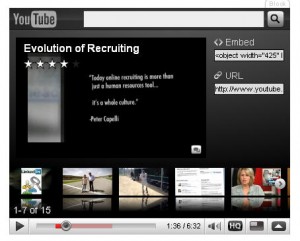“Today online recruiting is more than just a human resources tool . . . It’s a whole culture.”
That’s a quote from Peter Capelli, director of Wharton’s Center for Human Resources. It’s featured in The Evolution of Recruiting, a short, entertaining video put together by ERE’s Brendan Shields and HR superstar Susan Burns. (Excellent music, by the way!)
I don’t know exactly what Capelli meant by this statement–but it brings up a good question. “Cultures” can be quite closed to outsiders, especially when they are organized to focus on internal values. And it doesn’t ultimately matter whether exclusionary tendencies are the result of prejudice, profit-seeking, or just the desire to fit in.
So is it possible that the self-reinforcing culture of online recruiting is inherently (or at least potentially) unfair? Sometimes it does appear that HR experts and recruiting bloggers are focused mainly on the competition for top talent, oblivious not only to the challenges of job-hunting but also to the practical realities of staffing. And as mentioned in a recent post, quite a few of the readers who commented on an NPR story about online and social media recruiting had very negative reactions. Several voiced concern that this trend excludes older and poorer job seekers, who may have less technological expertise and access.
The issue is complicated. On the one hand, there’s a case to be made that most workers today need to be at least basically conversant with current technologies for working and communicating. So requiring them to demonstrate that competence during the job-seeking process is reasonable.
On the other hand–there may be some perfect people out there who won’t be found purely with bits and bytes. They might be ideal candidates for jobs that don’t require much technical sophistication, or they might be able to get up to speed quickly on whatever technology is required.
Hypothetically: Could someone without email potentially be an asset to your organization?
Sometimes we may have to ask not just what’s cutting-edge for the corporate Career site, but also whether the site supports a broad array of recruiting approaches, suitable for a real-life variety of candidates. We could think of it as the techno-equivalent of diversity . . .
I’d love to hear opinions on this.

 Boy shorts are one thing, but Y-front underwear for women? That’s not attractive. However,
Boy shorts are one thing, but Y-front underwear for women? That’s not attractive. However, 


